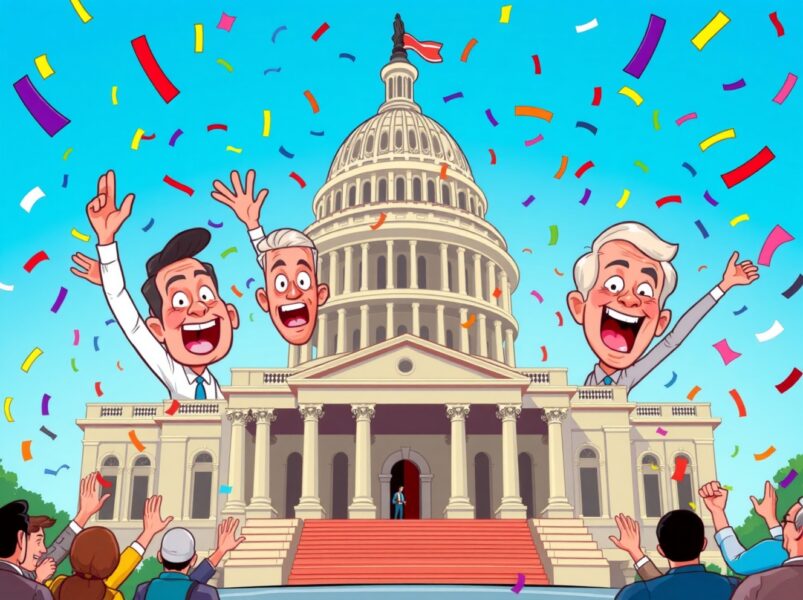United CEO Scott Kirby (L) and American CEO Robert Isom listen as DOT Secretary Sean Duffy speaks to reporters outside the White House on Thursday. (Photo by Kevin Dietsch)
Getty Images
A breakdown in commercial aviation could be as close as the next few days, and it will lead eventually to an end of the government shutdown now in its 31st day, says flight attendant leader Sara Nelson.
Nelson, president of the Association of Flight Attendants, the largest flight attendant union, emerged as a leader of the effort to end the 39-day 2018-2019 strike. She says the impact of this week’s failure to pay about 14,000 air traffic controllers and 60,000 Transportation Security Administration workers means that more and more stressed workers won’t come to work.
Staff shortages at TSA lead to long lines and potentially to flight delays, while staff shortages in ATC lead to flight delays and cancellations to preserve safety.
The Entire Commercial Aviation System Is Under Stress
“As I said in 2019, the system will break,” Nelson said Friday in an interview. “The system is everyday people who are heroes right now for working through this and keeping the economy going. But those heroes are human and there is a breaking point for humans.
“We know what happens when the planes stop,” Nelson said. “We see the impact of the shutdown there the most. Some people don’t get medicine. The economy stops. The country stops. We will see the shutdown impact that, as early as this weekend or early next week.
“For air traffic controllers, who are under resourced, there won’t be a decision on their part. They are going to report that they can’t safely due their job” due to staff shortages, Nelson said. “Then they will slow things down” to ensure safety.
On Thursday evening, the FAA warned in an advisory that Orlando International Airport was closed for a period when “no arrivals will be able to land as there will be no certified traffic controllers available.” Average delays on Thursday night were nearly three hours. Delays also occurred at JFK and DCA.
Air Traffic Controllers Missed Paychecks on Thursday
Controllers missed their paychecks on Thursday, Oct. 30. Anthony Schifano, president of the Charlotte local of the National Air Traffic Controllers Association, said in an interview on Wednesday that “controllers are “concerned, frustrated, disappointed. It’s just human nature. You can handle things for a while, but things compound. You can tell over time that people start to get frustrated.
“Air traffic control is a profession where you have to be at 100% for 100% of the time,” said Schifano, a controller for 25 years. “The way we are trained to operate is all about mitigating risk.” However, he said, stress from not getting paid “is not mitigating risk. It is introducing risk. ”
Airline Execs Back A Republican Plan To Open The Government
Nelson dismissed the calls Thursday by four airlines for a “clean continuing resolution,” a Republican-backed effort that would fund the government without addressing Democrats’ concerns that under the “CR,” health care costs would rise for 24 million Americans covered by Obamacare.
Following a White House meeting on Thursday, United CEO Scott Kirby told reporters that Congress should pass the CR, adding that the shutdown is putting stress on the economy. “It has been 30 days – I also think it is time to pass a clean CR,” said Kirby, who added that Congress should negotiate health care after the shutdown ends.
Said Nelson, “What you see from airlines is short term solutions and disregard the long-term effects. It’s a false narrative.” Paying federal workers and providing adequate health care should not be played off against each other, she said.
What Ended the 39-Day 2019 Shutdown?
Jan. 20, 2019, the thirtieth day of the previous shutdown, Nelson spoke out at a widely covered AFL-CIO event honoring Martin Luther King Jr. She advocated for other workers to join federal workers in a general strike. By Jan. 23, one in ten airport security workers did not show up for work. On Jan. 24, Nelson spoke at a media event at National Airport, again advocating for action to end the shutdown. “Many of these people are our veterans,” she said, her voice wavering. “Many of these people are fighting for our country right now, and we are not paying them.” A video of the speech went viral on social media.
On the next day, Jan. 25, East Coast flights were briefly grounded when about a dozen air traffic controllers at FAA oversight facilities in Jacksonville, Fla and Washington, who oversee planes already in the sky, called in sick, saying they could no longer do their jobs safely.
On that day, President Trump, who had insisted on border wall funding, endorsed a stopgap bill to reopen the government for three weeks while allowing for Congress to negotiate a deal. Widespread social media, newspaper and magazine coverage gave Nelson credit for ending the shutdown. A month later, a New York Times headline proclaimed, “The Shutdown Made Sara Nelson Into America’s Most Powerful Flight Attendant.”
Nelson said this shutdown is different in that “this time, it is a continuation of an effort to dismantle the government and programs that take care of people. But what’s not different is what I said in 2019, that the system will break when planes stop flying.”
Source: https://www.forbes.com/sites/tedreed/2025/10/31/air-travel-breakdown-nears-as-unpaid-atc-and-tsa-workers-face-stress/


